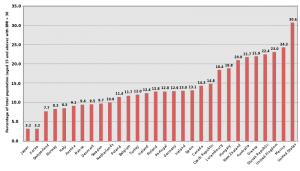Each human has our own microbiome; one that is unique to us. However, recent research has shown that the microbiome of someone’s body is not static, but highly subject to alteration. Microbiomes change depending on the atmosphere you are in- and they change very quickly, taking only nine months in the U.S. The University of Minnesota has found that, in people emigrating to the US, microbiomes “rapidly westernize”; aka, their native microbes are replaced with new ones. However, this shift in microbes is not equal- there aren’t enough new microbes to replace the old, resulting in a harsh decline in diversity; diversity that stimulates metabolism, digestion, and immune system development.
Dan Knights, a computational microbiologist at the University of Minnesota, states that in moving to another country, you pick up new microbes native to that country, and new disease risks as well. In this case, the shift in the microbiome makeup can be beneficial, as the new microbes may aid in defense against new disease. However, it has also been found that “Obesity rates among many of the study immigrants increased sixfold. Those who became obese also lost an additional 10 percent of their diversity.” This fact links diet shifts to microbiome shifts, yet Knights states that “diet alone wasn’t enough to explain the rapid Westernization of the microbiome,” and that other things such as water and antibiotic use factor in as well. However, diet is still an important part in microbiome health and diversity. Knights studied microbiota of Hmong and Karen women who had immigrated to the U.S., these immigrants’ American-born children, and white American controls. Their microbiomes shifted to Prevotella to Bacteroides, coming to resemble those of the white Americans who acted as the control. The immigrants’ children were even more susceptible to changes in and loss of microbial diversity.
We as Americans are highly aware of our obesity epidemic and are doing all we can to find a way to fix it. Research that links it to a cause relieves people- it provides hope that there is a way to change it. Knights remarks that “we do see that Westernization of the microbiome is associated with obesity in immigrants, so this could an interesting avenue for future research into treatment of obesity, both in immigrants and potentially in the broader population.” However, it cannot be used as an excuse for our problem as Americans- it is simply a breakthrough in a long journey that may help us in the long run.



Leave a Reply